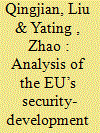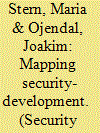| Srl | Item |
| 1 |
ID:
147302


|
|
|
|
|
| Summary/Abstract |
With the security situation in Africa looking pessimistic since the beginning of the 21st century, the EU has adjusted its ODA policy in Africa by linking it to security issues. The EU has been carrying out a number of security-development aid projects and these have seen some positive results. However, shortcomings have been identified . Even so, it is of historic significance that African nations are working more closely with the EU in the areas of security and aid under the framework of Agenda 2063.
|
|
|
|
|
|
|
|
|
|
|
|
|
|
|
|
| 2 |
ID:
104028


|
|
|
|
|
| Publication |
2011.
|
| Summary/Abstract |
The critical and considered response by Simon Reid-Henry (2011) reinforces our sense that the widespread attention being given to the 'security-development nexus' in the realm of policy warrants careful and critical scrutiny. Perhaps most significantly, Reid-Henry's review article draws attention to the need to engage in the difficult - and often overlooked - questions of methodology: how can we creatively study the different ways in which the 'nexus' is being practised, negotiated and resisted in distinct sites - and to what effect? His comments therefore add much to our collective (yet necessarily disparate) efforts to develop an array of creative methodologies for the study of the 'nexus'. Continuing the spirit of constructive critique, we engage with some of his main lines of argument. It is vital, we believe, to remember that there are many ways of exploring the politics of security-development, each requiring different road maps. Furthermore, as Véronique Pin-Fat reminds us, even the astute and committed pursuance of any given map may blind us to 'finding' what we are looking for.
|
|
|
|
|
|
|
|
|
|
|
|
|
|
|
|